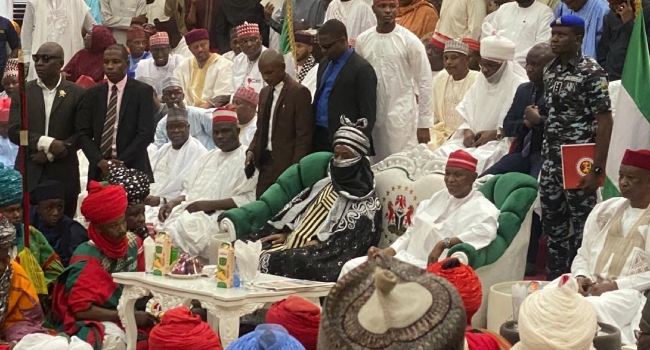
• Cost-push inflation looms, says energy economist
• More burden for economy, industries over high costs
There are indications that President Bola Tinubu will, in the coming days, direct the Nigerian Electricity Regulatory Commission (NERC) to implement the 2024 multi-year tariff order (MYTO), which could raise the current tariffs by close to 200 per cent.
Coming on the heels of an increase in the price of natural gas, this could increase the burden on households and reduce the buying power of Nigerians who are already grappling with multiple challenges.
The 2024 MYTO would see the electricity tariff increasing to an average of N205 per kilowatt hour (KWh) from the current midpoint (N70 kWh). That will increase the tariffs across user categories by roughly 193 per cent.
Electricity subsidies stood at N5.4 trillion in the last 10 years. Since Tinubu came to office, the subsidy for electricity has risen to nearly N1 trillion in nine and it is projected to hit N2 trillion this 2024.
While sources at the presidency had told Bloomberg that the tariff would be implemented in matters of weeks, the Nigerian Midstream Downstream Regulatory Authority (NMDPRA) had adjusted the price of natural gas for the power sector from $2.18 to $2.42 with an additional $0.5 – a development stakeholders have kicked against.
Recall that gas supply, which was sold to generation plants at an obligated $2.18 per million British Thermal Unit (MMBTU), has been confronted with naira-induced challenges. While the cost per MMBTU in naira was only N390 in 2021, it went to N411 per MMBTU in 2022 and rose to N653 per MMBTU in 2023 and N800 per MMBTU in January, this year, before soaring to N1, 496 in February before the NMDPRA increased it on Sunday.
This comes as inflation has risen significantly from 16 per cent in 2021 to over 31 per cent in February.
As of 2015, electricity subsidy in Nigeria was N225 billion and rose to N308 billion in 2016; N351 billion in 2017; N440 billion in 2018; N528 billion in 2019 and N501 billion in 2020. In 2021, it was N251 billion; N144 billion in 2022; N645 billion last year and projected to hit over N2 trillion in 2024.
Tinubu had suspended the Service Based Tariff (SBT), which was imposed by the previous government as it coincided with the removal of subsidy on premium motor spirit (PMS), which Tinubu later returned through the back door.
Going by the NERC tariff order for 2024, most customers in the northeast under Yola DisCo would be paying between N234 kWh and N179 kWh. Those under Jos DisCo will pay between N166 and N101 kWh, depending on their bands, which span between A and E.
Also, those under Ikeja Electric would pay between N143 and N69 kWh while Abuja DisCo would charge N153 and N74 kWh. Those under Eko DisCo are billed between N125 and N79 kWh. Consumers under Benin DisCo would part with between N137 and N100 kWh.
Enugu will charge N154 and N95 kWh while Kano will collect between N159 and N90 kWh depending on the band customers belong to. In Ibadan DisCo, the charges are between N140 and N97 kWh while in Port-Harcourt DisCo it is between N142 and N100 kWh. In Kaduna DisCo, it is between N163 and N88 kWh.
Bloomberg had reported that a hike of N200 from an average of N68 was looming for urban consumers.
Since Tinubu suspended electricity subsidies last year, he has not been able to meet up with the shortfall and that has impacted electricity generation, crippling grid performance to about 3,000MW.
Between January and February this year alone, electricity subsidy jumped to N267 billion, while payment to generation companies dropped from 92 per cent in 2022 to 12 per cent in January and February, an indication that power generating plants are inching towards shutdown.
According to industry statistics seen by The Guardian, the subsidy, which was N12 billion in 2022, moved to N37 billion between January and April 2023. It went up to N55 billion between May and September and settled at N74 billion between October and December before spiking to N267 billion in the first two months of the year.
While the NERC had pegged the 2024 MYTO on a gas price of $2.18, the new price of $2.42 for every MMBTU spells danger, especially for consumers who are often at the receiving end.
NMDPRA, which released the pricing first on X official handle before wide publication in the newspapers today disclosed that commercial customers would buy gas at $2.92/MMBTU. It based the decision on the provisions of the Petroleum Industry Act (PIA) empowered a regulatory framework for the determination of a market-based pricing regime for the domestic gas market in Nigeria.

The document signed by the Chief Executive Officer of the agency, Farouk Ahmed, noted that the regulatory authority is mandated to determine the Domestic Base Price (DBP) and the marketable wholesale price of natural gas supplied to the strategic sectors.
Stating that the decision was taken after due consultation with key stakeholders and taking into cognisance the provisions of the PIA, Ahmed said the pricing is for the Domestic Base Price of $2.42/ MMBTU and wholesale prices of natural gas.
While Nigeria is currently pushing to increase gas production and boost the gas-based economy with a decade of gas policy, the new gas rate is being described as a dilemma for the Nigerian economy.
President of the Nigeria Economic Society (NES), Prof. Adeola Adenikinju, believes that increasing gas prices would trigger more investment from gas companies but would also increase the cost of power supply.
He noted that the increase would increase the returns to investment in the gas sector, potentially impacting positively on gas supply and the investment in gas supply infrastructure.
“However, it will also raise the price of power supply and costs of production in other gas-using sectors. This can lead to higher inflation and increase energy losses in the power sector as consumers, unable to afford higher electricity tariffs, may explore illegal connection options. The losses recorded in the electric sector may rise and spike further,” Adenikinju said.
He noted that the key metric to look at is improvement in power supply, adding that the net effects on the economy would be positive if it would translate into a more reliable electricity supply in the country.
Energy and Business Consultant, Dan Kunle, noted that both electricity and gas sectors need the appropriate cost-reflective tariffs, stressing that like the power sector gas investment is capital intensive. According to him, Nigeria needs huge investment in all these if the country is to drive the power sector and the petrochemicals industries.
Kunle said power depends so much on gas in Nigeria and that if the price of gas is not appropriate, supplies would dry up. Also, power costs must adjust to the new realities.
Kunle insisted that it was justifiable for the power tariff to go up, adding that the federal government cannot continue to carry the subsidy on power and petrol.

“I am not surprised that the power sector has collapsed completely. Gas and electricity cannot be cheap yet in Nigeria. The investment deficits in both sectors are so wide. It may even be cheaper and more competitive to import oil and gas from across the Atlantic to Nigeria,” Kunle said.
A renowned energy economist, Prof. Wunmi Iledare, said increasing the price of natural gas for power has cost-push inflationary implications.
The immediate impact, according to him, is the cost to generate power and the propensity to transfer the cost to the consumers is high.
Speaking further on the many implications, Iledare said there will be a significant reduction of disposable income available to buy goods and services after paying for a lot of power as well as the purchasing power of money due to high inflation attributable to cost-push inflation.
“The oil and gas sector under this scenario is not going to be better off even though the increase in natural gas price may lead to more gas for the power sector.
There will be more gas to buy with no buyers because there is currently a price-elastic demand for gas in the power sector. Evacuating the generated power at a high price may be delimited for the distribution companies.
Finally, the authority to increase the price of gas for power by invoking provisions in the PIA 2021 represents the trilemma of the intent, the spirit and the letters of the Act,” Iledare said.
Electricity Market Analyst, Lanre Elatuyi said with the volatility in the exchange rate, it is expected that gas producers would increase their cost of production.
“The implication on the power sector is obvious as gas is used to generate about 80 per cent of electricity in the country. The present end-users’ tariff was arrived at using $2.18 as the cost of gas, with the increase to $2.42, and gas price is a pass-through cost, the end users tariffs will inevitably go up,” he said.













